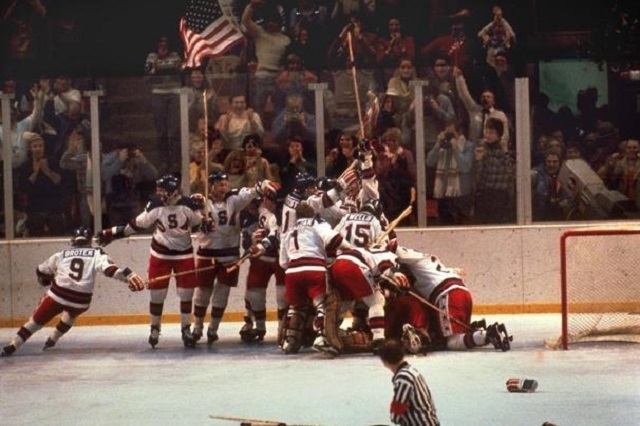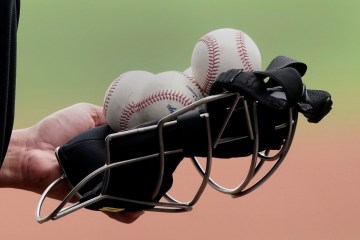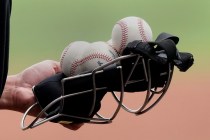7 biggest upsets in Winter Olympics history
Perhaps the biggest upset so far at the Sochi Olympics has been Swiss snowboarder Iouri Podladtchikov beating out American Shaun White for the gold medal on the halfpipe.
White, a heavy favorite for the gold, finished in fourth place after falling twice in his first run and nearly falling again in his second.
It got us thinking — what are the biggest upsets in Winter Olympic history? Here are seven of them, in chronological order:
Great Britain beats Canada in ice hockey - Garmisch-Partenkirchen, 1936
Until 1936, Canada had won ice hockey gold in every Winter Olympics since the inaugural games in 1920. The team they lost to is what made their 1936 silver medal particularly painful.
Great Britain ended up taking the gold, but with a team largely made up of Canadians.
Only one team member was born in Canada, but nine of the 13 had grown up in the country and 11 had previously played there. The British team beat the Canadians in the semifinals and went on to win the gold, handing Canada its first ice hockey silver in Olympic history.
Canadians are still smarting over the loss, too, judging by this recent headline in the Calgary Sun: “Team Great Britain made up of traitorous Canadians stole 1936 Olympic gold in hockey from undefeated Team Canada.”
Miracle on Ice - Lake Placid, 1980
It’s been called the top sports moment of the 20th century. Team USA made up of collegiate and amateur hockey players beat a Soviet Union team that had won nearly every world championship and Olympic tournament since 1964.
The Soviet team played in a well-developed league and was led by legendary players, compared to a U.S. team led by Herb Brooks, a largely unknown coach from Minnesota. Despite having only one player with prior Olympic experience, the underdogs beat Russia 4-3 and went on to beat Finland to take the gold. The Soviet Union won silver by beating Sweden.
“Few victories in American Olympic play have provoked reaction comparable to tonight’s decision at the red-seated, smallish Olympic Field House,” The New York Times wrote about the win. “At the final buzzer, after the fans had chanted seconds away, fathers and mothers and friends of the United States players dashed onto the ice, hugging anyone they could find in red, white and blue uniforms.”
Oksana Baiul’s Victory - Lillehammer, 1994
The Tonya Harding-Nancy Kerrigan scandal cast a dark pall over the 1994 Olympics in Lillehammer, Norway, but there was more than one drama playing out on the ice that year.
Sixteen-year-old Ukranian skating wunderkind Oksana Baiul was injured the day before the long program, and Kerrigan had been clubbed in the knee seven weeks prior by Harding’s ex-husband, but both skated beautifully.
Baiul ended up beating Kerrigan by the narrowest of margins: Five of the nine judges gave first-place scores to Baiul and four to Kerrigan after the four-minute freestyle programs. Those scores, which accounted for two-thirds of the final score, led to a controversial gold for Baiul and a silver for Kerrigan.
Bauil became the youngest women’s gold medalist since Sonja Henie of Norway in 1928.
Tara Lipinski defeats Michelle Kwan - Nagano, 1998
In 1998 there were two U.S. figure skating darlings: 17-year-old Michelle Kwan and 15-year-old Tara Lipinski. Kwan was favored to win over Lipinski, who would become the youngest individual gold medalist in Olympic history if she beat Kwan.
Lipinski, the reigning world champion, created a near-perfect short program, but Kwan still won the day. The long program was a different story, though. Lipinski’s more technical program and her famous triple loop-triple loop combination led her to the gold. Kwan ended up taking home silver.
Steven Bradbury wins after everyone else crashes - Salt Lake City, 2002
One of the weirdest gold-medal wins in Olympic history came in 2002, during the 1,000-meter final in short-track speed skating.
Apolo Ohno was the face of short-track speedskating among U.S. fans in 2002, but his gold-medal hopes were dashed after a collision turned into a pile-up.
Ohno was in the lead, but got tangled up and undercut by China’s Li Jiajun during a turn around the final corner. The collision also tripped up Ahn Hyun Soo and Mathieu Turcotte, leaving Australia’s Steven Bradbury, who had been trailing, as the last man standing.
Bradbury ended up taking the gold, becoming the first person from the Southern Hemisphere to win gold at a Winter Olympics. And although his leg had been sliced open, Ohno was able to crawl to the finish line to take silver.
Jill Bakken and Vonetta Flowers win - Salt Lake City, 2002
Jill Bakken and Vonetta Flowers weren’t even supposed to be the best U.S. bobsled team, let alone the best in the world.
They proved their doubters wrong in 2002, though, beating the favored Germans and the other American team to take home the gold.
The victory ended a 46-year drought for the U.S., which hadn’t medaled in bobsled since U.S. men won the four-man bronze in 1956.
The U.S. hadn’t taken gold since the men’s team won the four-man event in 1948.
Flowers’ victory was momentous for another reason: The 28-year-old became the first African-American in history to win a gold medal at the Olympic Games.
Sarah Hughes wins gold - Salt Lake City, 2002
Sarah Hughes would have been lucky to take the bronze after placing fourth in the figure skating short program at the Salt Lake City Olympics.
During her long program, though, she astounded the judges by landing seven triple jumps as the three skaters ahead of her in the standings were all penalized for mistakes.
At the time, the fourth-place finisher in the short program couldn’t automatically win the event if the skater won the free skate, so Hughes had to win the free skate and rely on first-place Michelle Kwan to lose to both Hughes and another player.
She did just that, and Hughes became the first skater in Olympic history to come back from fourth place to take the gold.
Contact Stephanie Grimes at sgrimes@reviewjournal.com. Find her on Twitter: @steph_grimes

















